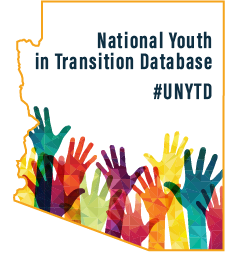
Research
Cutting-edge research & defining best practices
Our research provides greater responsiveness to the area of child well-being through data-driven and evidence-informed decision-making. We identify emerging best practices and provide an evaluation focused on system improvement.

National Youth in Transition Database Survey (NYTD)
CCWB partnered with the Department of Child Safety and Child Welfare Education Program in 2019 to pilot a new approach to surveying foster youth in Arizona to meet the requirements of the federally mandated NYTD outcome survey. The NYTD outcome survey is a longitudinal survey that requires all states to collect data on youth in foster care at age 17 and then conduct follow-up surveys with these same youth at ages 19 and 21. In October of 2021, CCWB will begin conducting follow-up surveys with 17-year-olds surveyed in 2019, who are now beginning to turn 19.
The goal of NYTD is to determine how states are doing at providing services and engaging overall with youth as they transition from foster care to young adulthood. The NYTD survey looks at youth educational aspirations, health care, work experience, feelings about their experience of foster care, among other areas. The federal government requires specific data be collected and allows states to add questions to the survey. CCWB and the Department of Child Safety collaborated to define additional areas where more knowledge was needed in order to improve services for transitioning youth in Arizona.
CCWB has also worked to create an online website where Arizona youth can access information about the survey as well as find information on vital resources, and connect with the project through email (UNYTDAZ.com). In addition, CCWB created a social media presence for youth, utilizing Facebook, Instagram, and Twitter, that provides ongoing information on the Arizona NYTD survey as well as ongoing updates on available resources.
The NYTD team wrote an article for the Child Welfare League of America, Children’s Voices, entitled “Arizona National Youth in Transition Database: An Innovative Child Welfare Agency and University Collaboration”. This article describes the process of developing and implementing the project and provides recommendations for engaging in child welfare agency and university collaborations to meet federal reporting requirements while advancing knowledge about young people in transition.
Safe Babies Court Team
The Center for Child Well-Being is conducting research funded by Prevent Child Abuse Arizona to determine the current state of implementation of the Safe Babies Court Team (SBCT) across the state. This evaluation seeks to identify the barriers and challenges in preventing SBCT from implementing the Core Components as well as the Core Components that sites are most prepared to develop and implement. Furthermore, the evaluation will consider how service coordination for families can be improved via workforce training and awareness on emerging programs, culturally responsive practices, protective factors, and trauma-informed approaches.
We have partnered with the Family Involvement Center (FIC) to assist in the development of their Dad Together Program. The Dad Together program utilizes Father Support Specialists who provide dad to dad mentoring and support to all fathers. There are five components of the Dad Together evaluation, including a literature review on father engagement, the articulation of the FIC Dad Together program model, development of a measurement plan, creation of a data collection plan and pilot testing the measures and data collection, and a proposed process and outcome evaluation plan to be implemented in Year 2.
We have partnered with the Family Involvement Center (FIC) to evaluate their Parents for Parents program. The Parents for Parents program utilizes Parents Allies who have lived experiences with child welfare to help current child welfare involved parents navigate the system. There are four components of the Parents for Parents evaluation, including an analysis of the Parents for Parents HOPE Class, an analysis of the peer parent model utilized by the FIC and how FIC supports Parent Allies, an analysis of Parents for Parents use of Team-Based Parent Representation, and finally a case outcome analysis of parents who attended the HOPE Class versus parents that did not attend the HOPE Class. We hope that our evaluation of Parents for Parents will contribute to the body of child welfare evaluation research and underscore the importance of utilizing Parent Allies with lived experiences to improve child welfare outcomes for families.
Past projects
- 5 year DCS Title IV-E demonstration waiver evaluation: focused on reduction of children in congregate care
- DCS statewide survey of DCS foster parents (combining voluntary license closures with actively licensed foster parents)
- Statewide scan of human service provider training
- AZ Children's Action Alliance: subcontract to update Arizona child well-being secondary data for Annie E. Casey's National KIDSCOUNT database.
- (2017) Best for Babies, Arizona 2016 County Evaluations
- (2015) Maricopa County Juvenile Court, Cradle to Crayons program evaluation
- (2015) DCS foster parent satisfaction survey
- (2015) Prevent Child Abuse AZ: Best for Babies
- (2014) DCS study of foster parent voluntary license closures